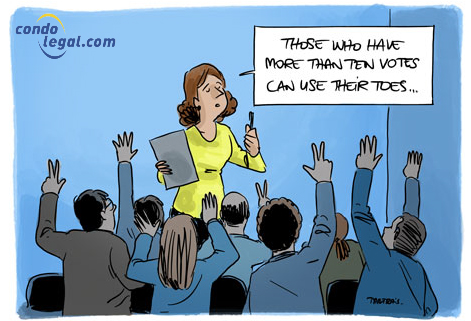21 Articles

Section 339 of the Civil Code of Quebec establishes as a basic rule that the term of office of a director is one year. The By-law of the immovable usually describe all the terms and conditions specific to the office of director, including the duration of his mandate. Thus, a syndicate of co-owners may, at the end of the By-law of the immovable, extend the duration of the building to more than one year (for example to two or…...

When board members meet for a meeting, the agenda is essential so that they can deliberate effectively. It guides discussions and maintains attention on relevant topics. Board members should familiarize themselves with the issues and relevant documentation prior to the meeting. The agenda, usually prepared by the president of the board of directors and attached to the notice of meeting, lists the questions and the items to be discussed, covering a variety of topics, from finances…...

The first sentence of article 1090 of the Quebec civil Code states that "Each co-owner is entitled to a number of votes at a general meeting proportionate to the relative value of his fraction." The number of votes is related to the share of property rights each co-owner holds in the building. Therefore, the co-owner of a private portion whose relative value is higher will have more voting rights. In return, he or she will have to contribute to a larger portion…...

The director of a co-ownership is called to play a key role in the sound management of the co-ownership and preservation of co-owners' assets. To strengthen and maintain the relationship of trust with them, every director must be fair, honest and loyal toward the Syndicate and the co-owners. The director must also respect ethical standards and the Code of conduct stipulated by the Civil Code of Quebec and the declaration of co-ownership. In case of doubt, directors must act according to the…...

The members of the board of directors play a key role in the co-ownership: they must be involved in the life of the building to ensure the proper management of the co-ownership and the well-being of the co-owners. Usually appointed by the Meeting of the co-owners, the director is a member of the Board of Directors of the syndicate. Its duties are to make decisions on the directions and priorities of the Syndicate. Such Decisions are…...

The Civil Code of Québec confers juridical personality on the community of co-owners. Article 1039 of the Civil Code of Quebec provides that as soon as the declaration of co-ownership is published, the community of co-owners constitutes a legal person called a syndicate of co-owners. Those duties and obligations are mainly aimed to ensure the preservation of the immovable, the administration of the common portions and the protection of the rights affecting the immovable or…...

The law does not establish an exhaustive list of the duties and obligations that the members of the board of directors must assume. It is the declaration of co-ownership (constituting act of the co-ownership) and certain articles of the Civil Code of Québec which, for the most part, determine them. Furthermore, the administrators are considered to be agents of the syndicate. Directors must therefore act within the limits of the powers conferred on them by…...

With respect to the Annual General Meeting, the article 1087 of the Civil Code of Québec provides that certain documents must be attached to the notice of meeting.These documents are to be sent to co-owners so that they can ascertain the exact nature of the questions and issues to be discussed. Some of these documents, described in the agenda, are a prerequisite to the validity of the decision (such as, a draft amendment to the…...

One of the essential moments of co-ownership is undoubtedly that of the meeting of co-owners. It is during this meeting that major decisions of the co-ownership are voted, such as the carrying out of certain works, the sale of a common portion and the modification of the declaration of co-ownership. Co-owners will also be able to debate and reflect on the directions to be given to their co-ownership. In addition, the assembly provides a unique…...

The board of directors occupies an important function in co-ownership governance. It holds meetings as often as the interest of the collectivity of co-owners require and addresses any matter that concerns the syndicate’s good management. These meetings are moderated by a president who ensures their efficient conduct. Directors can debate and reflect upon the orientations to give to their co-ownership. The more carefully and methodically the meetings are prepared, the more motivated and interested the…...
